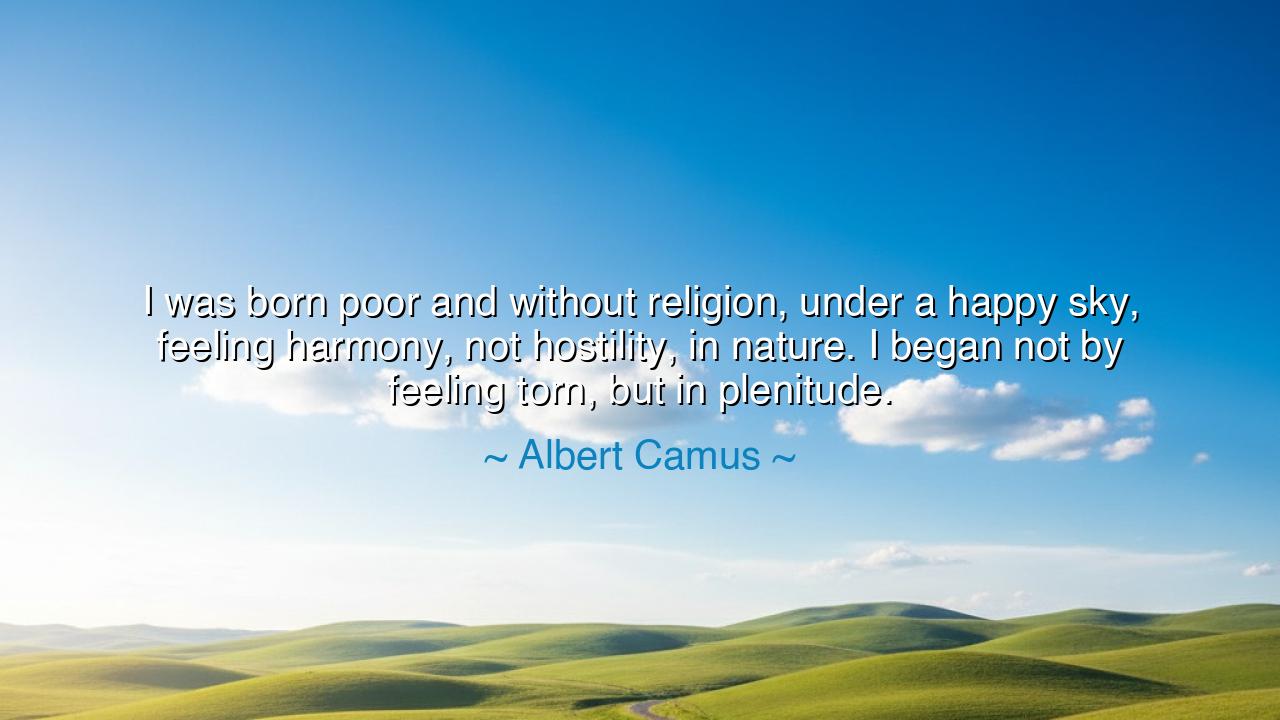
I was born poor and without religion, under a happy sky, feeling
I was born poor and without religion, under a happy sky, feeling harmony, not hostility, in nature. I began not by feeling torn, but in plenitude.






Albert Camus, the philosopher of sunlight and shadow, once reflected on his origins with these words: “I was born poor and without religion, under a happy sky, feeling harmony, not hostility, in nature. I began not by feeling torn, but in plenitude.” In this utterance lies the soul of his thought, for it reveals a man who found his first teacher not in wealth nor in doctrine, but in the embrace of the natural world. His childhood, though marked by poverty, was not marked by misery, for the sky above him was generous, and the harmony of nature filled him with a sense of abundance beyond possessions.
The ancients would have understood this well. Before temples of stone and scrolls of theology, mankind learned from the rising sun, from the cycle of seasons, from the sea that gives and takes. To live without religion did not mean to live without wonder—it meant to live close to the sacred rhythms of the earth. Camus, like the Stoics of old, felt himself part of this great whole, not torn between heaven and hell, but at peace within the beauty of existence. In the plenitude of nature, he found what many seek in altars and scriptures: belonging, meaning, and joy.
Consider the life of Diogenes, the Cynic philosopher. He owned almost nothing, slept under the open sky, and mocked the pomp of wealth and power. Yet he declared himself richer than kings, for he lived according to nature. When Alexander the Great offered him any gift he desired, Diogenes asked only that the conqueror step aside and stop blocking the sunlight. Here too we see the truth of Camus’s words: poverty need not mean despair, for the man who is in harmony with the world already lives in abundance.
Camus’s declaration also carries rebellion. In a world torn by ideologies, wars, and dogmas, he spoke of a beginning not torn, but whole. Many are taught from youth to see division: man against nature, soul against body, heaven against earth. But Camus began with unity. He teaches us that perhaps we are not born broken, but are made so by systems that demand conflict where none need exist. His plenitude was not of gold, nor of creed, but of the simple happiness of breathing under the wide sky, of walking with the earth as companion rather than enemy.
Yet, O listener, do not mistake his vision for naïveté. Camus knew well the cruelty of history, the absurdity of suffering, the indifference of the world to human pain. But he believed that even in the face of absurdity, one could choose joy. To be born poor, yet feel abundance; to live without religion, yet feel sacredness; to begin life not in fear but in harmony—this was the soil from which his philosophy grew. And in this lies his defiance: that joy can exist without illusion, and plenitude without possessions.
The lesson is clear: you do not need riches to feel rich, nor temples to feel reverence, nor doctrines to feel at home in the universe. The happy sky is free, the earth gives its beauty without charge, and harmony is offered to all who listen. What divides us is not nature, but the illusions of pride, greed, and hostility we create. Camus reminds us that a simple life lived attentively may be fuller than the most gilded palace, and that in the silence of nature, one can feel the deep abundance of being alive.
Practical wisdom flows from this: each day, step outside and look upward. Let the sky remind you of your place in the vastness, and let the breath of wind remind you that you belong. Do not measure your worth by what you own, but by the depth with which you see, feel, and love. If you feel torn, seek not more possessions or louder doctrines, but return to simplicity: the warmth of the sun, the song of birds, the company of those you love. In these, you will find the plenitude that Camus carried from his first breath.
So, O children of tomorrow, let this be your inheritance: life begins not in division, but in harmony. To be poor is not to be empty, and to live without religion is not to be without wonder. If you can feel the beauty of the earth and walk in its rhythm, you will carry abundance wherever you go. Guard this truth, for it will steady you against the chaos of the world, and it will remind you, as it reminded Camus, that beneath the absurdity of life, there is still joy, still sunlight, still plenitude.






AAdministratorAdministrator
Welcome, honored guests. Please leave a comment, we will respond soon